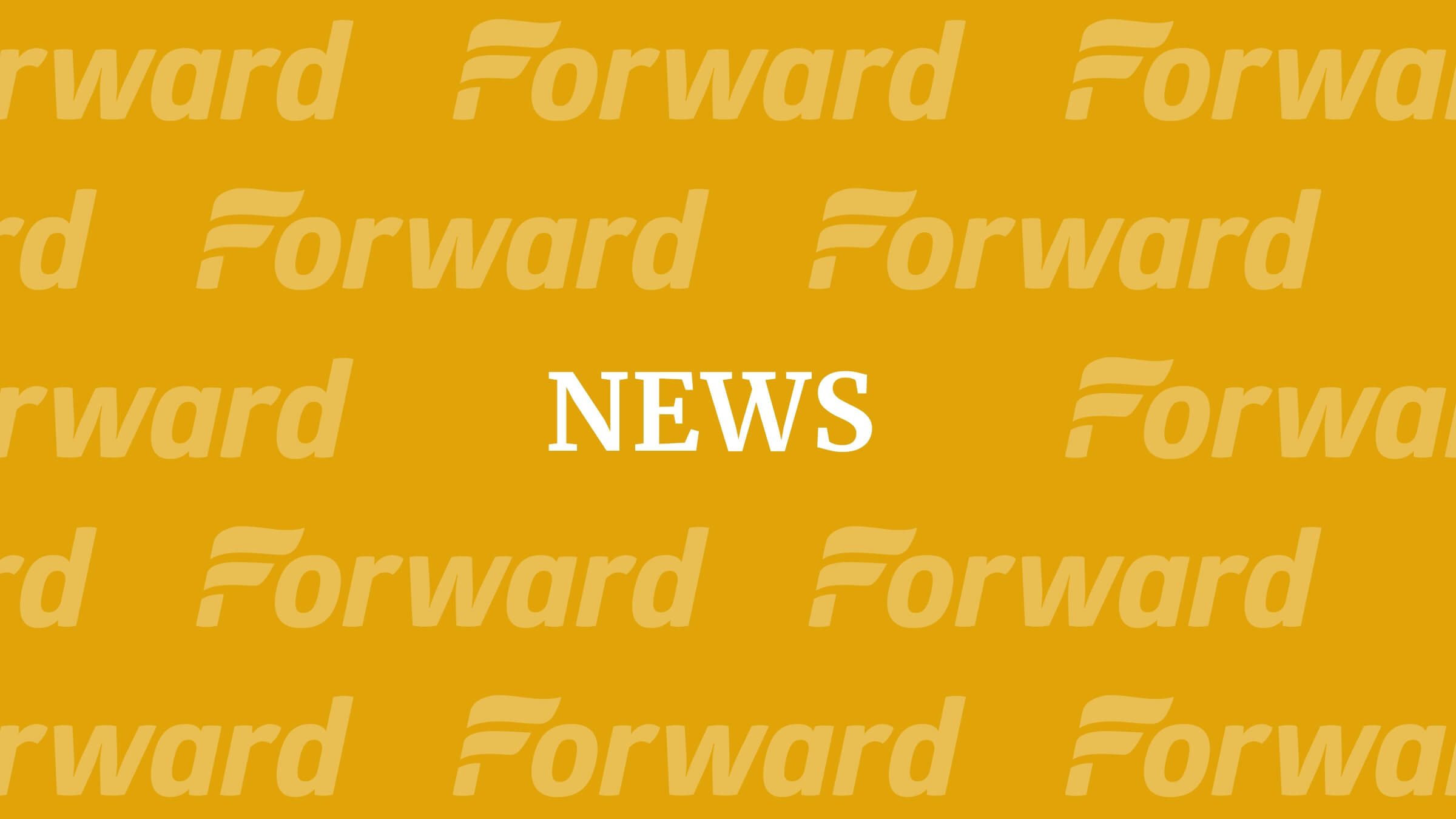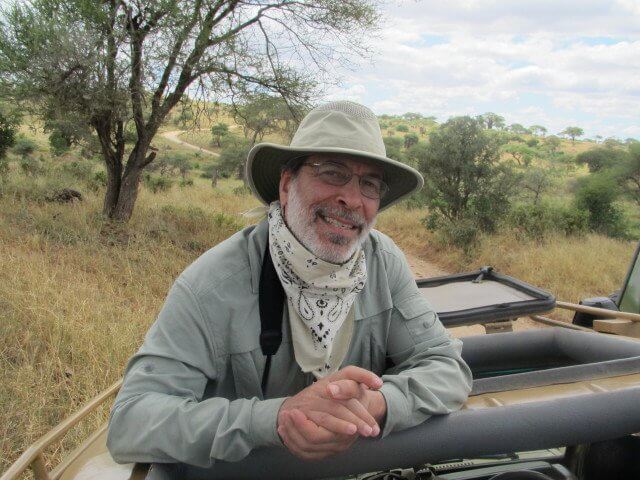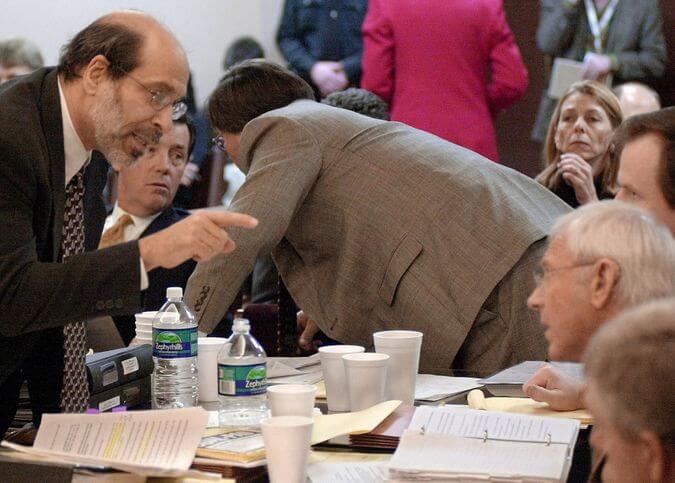This lawmaker and rabbi was scheduled to deliver an invocation. His colleagues replaced him with a Christian
‘So many Montanans suffered so many indignities this session that being barred from leading a prayer pales by comparison,’ said Montana Rep. and Rabbi Ed Stafman

Graphic by Angelie Zaslavsky
On one of the last days of this year’s legislative session, Montana Rep. Ed Stafman — who is also a rabbi — learned that he would not, as expected, deliver that day’s invocation.
He had chosen some verses from Isaiah about how actions are more important than words. But before he could address the House, a colleague told him that he would not be leading the prayer that day.
She was “very apologetic and made it clear it was coming from the [House] speaker,” Stafman, 69, told the Forward. “I was never given a reason.” Stafman, who wears a kippah, took the House floor and asked for permission to speak. He said he felt he had been “shut down” because “I’m not a Christian or delivering a Christian prayer.” He would not lead a prayer, it turned out, for the rest of the session.

Word got around Montana’s small Jewish community, whose members wondered why a Jewish representative — a rabbi no less — couldn’t take his turn. Most state legislatures begin the day’s work with a prayer. In Montana, it’s almost always Christian, and usually in Jesus’ name, Stafman said.
The rabbi, who was ordained in the Jewish Renewal Movement, and twice won a seat representing parts of Bozeman, had given the invocation in a previous year. Before the pandemic, he said, outside clergy would be invited to offer it, but lawmakers began doing the job themselves to limit the number of people at the capital. As the emeritus rabbi of Bozeman’s Congregation Beth Shalom, he said he’s one of only two Montana House members — the other is a pastor — who have delivered prayers professionally.
Some of those upset over the cancellation of Stafman’s invocation noted that this year’s legislative session — the body meets for 90 days every other year — was particularly acrimonious. Leadership, dominated by conservative Christian Republicans, had seemed to grow increasingly hostile to Democrats like Stafman and others who pushed back on an agenda that included bills to ban abortion and limit the rights of trans and other queer people.
But many of Montana’s Jews say they are also upset that in the weeks since Stafman was informed that his prayer was not welcome, state officials have not acknowledged their concerns — that Stafman had been sidelined because his prayer would not have been Christian, and because his politics conflicts with that of the state’s Republican leadership.
“There’s still no explanation. They’ve just left everyone hanging at a time of rising antisemitism,” said Rabbi Mark Kula of Congregation Beth Aaron in Billings and a leader of the Jewish community at the University of Montana. “The legislature is very single-minded right now. It’s focused on a white, male, Christian agenda.”
Population estimates for Montana’s Jews range from 1,500 to 5,000.
The Anti-Defamation League has tracked an uptick in antisemitic incidents in the U.S. in recent years. It noted in a recently released report that chapters of the White Lives Matters network of white supremacists have been especially active in Montana. Another report, released last year and based on data from the Southern Poverty Law Center, concluded that Montana has more hate groups per capita than any other state.
Unanswered letters
Rebecca Stanfel, director of the Montana Jewish Project, which last year reclaimed the state’s oldest synagogue in Helena to serve as a statewide Jewish community center, emailed a letter to Montana House Speaker Matt Regier, a Republican, on May 4, three days after Stafman was rebuffed. She wanted to know why.
“A Christian legislator was given this honor instead,” she wrote, adding that many people, Jewish and otherwise, had contacted her to express dismay. Stanfel said she has not received a response.
She emailed more letters on May 12, to House Majority Leader Sue Vinton and Gov. Greg Gianforte, both Republicans.
Silence from the speaker “exacerbates our community’s feeling of exclusion and our concerns about the scale of antisemitism in the Treasure State,” she wrote, and requested that they and other state leaders use their positions “to publicly condemn antisemitism and the exclusion of Jewish voices in Montana in the strongest terms possible.”
Stanfel said on Thursday that she has received no response from either.
Neither Regier, Vinton or Gianforte immediately responded to the Forward request for comment.
‘So many indignities’
Speaking to the Forward from a Montana campsite Thursday, Stafman said he doesn’t want the incident to overshadow the broader damage he feels his legislative colleagues inflicted this year on Montana’s most vulnerable people.

“So many Montanans suffered so many indignities this session that being barred from leading a prayer pales by comparison,” said Stafman, who moved to the state 15 years ago. “There was a whole bunch of legislation that had Christian nationalist overtones.”
Still, he said, his treatment shouldn’t go unnoticed either, because it shows how — not Christianity — but a fundamentalist Christian mindset, has overtaken Montana politics.
It’s apparent in the anti-abortion and anti-LGBTQ bills, he said, but also in the legislature’s Bible study, led by two Christian ministers. He said he went often during the first half of the last session, but then stopped. The group wanted only Christian perspectives to be heard, he said.
“They never said anything to me, that ‘you’re not welcome,’ but the context was clear. It was just for Christians,” said Stafman, who was a trial attorney in Florida and worked for the Democrats during the 2000 presidential election recount before he was ordained.
Non-Jews have been speaking out alongside Montana’s Jewish community.
On May 6, the Council on American-Islamic Relations issued a statement urging Montana lawmakers to respect religious diversity. “Rep. Stafman, and the citizens of Montana, deserve an explanation as to why he was not allowed to offer his prayer,” said Ibrahim Hooper, the group’s spokesperson.
Laurie Jungling, bishop of the Montana Synod of the Evangelical Lutheran Church of America, said it’s important for her to stand by her “Jewish siblings.”
“I hesitate to use the word ‘antisemitic,’” she said, referring to the House speaker. But the area of the state he represents is home to some white supremacists who believe that the U.S. should be a particular type of Christian nation “that only holds to certain beliefs and one of them, sadly, is that people of other religious traditions should not be given a voice.”
Kula, the Billings rabbi, said that although it is too late for Stafman to give a prayer before the Montana House this year, it’s not too late for the House leadership to offer him an apology, and make sure he’s on the invocation schedule the next time the legislature convenes for its regular session, in 2025 — “whether he is an elected official or not” then.

















